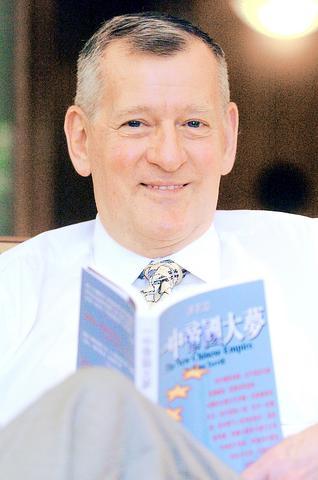A nephew of the Dalai Lama and former member of the Tibetan parliament-in-exile, Khedroob Thondup, 52, yesterday expressed appreciation for Ross Terrill's new book, The New Chinese Empire, at a question-and-answer seminar the author held with academics and officials at the Taiwan Research Institute.
Terrill met with President Chen Shui-bian (

PHOTO: GEORGE TSORNG, TAIPEI TIMES
The seminar was held to illustrate the main ideas in the book.
Born in Calcutta, Khedroob was educated at a well-known Jesuit school in Darjeeling, India, and later at the University of San Francisco, where he was awarded an MBA.
After returning to India, he served as special assistant to the Dalai Lama and traveled extensively with him. In 1980, Khedroob was part of a special team that started dialogue between the Tibetan government-in-exile and the People's Republic of China (PRC).
Describing Tibet at the seminar as "one of the most oppressed autonomous regions without any of the freedoms that have been taken for granted in Taiwan," Khedroob, who now lives in Taiwan, lamented Beijing's grip on Tibet's religious freedom and its abuse of human rights in that country.
He asked the author, a renowned China expert, whether a genuine autonomy is acceptable to Beijing.
Terrill's answer to Khedroob's question was less than encouraging.
"Ask the people in Hong Kong in five years' time and you will have the answer," Terrill said.
The people of Hong Kong, Terrill said, had autonomy promised to them but they will find that the Communist Party will refrain from honoring that pledge.
Noting that Beijing has recently rewritten Hong Kong's Basic Law, Terrill questioned the completeness of an autonomy "that is not guaranteed by law."
If China were to give Taiwan autonomy, according to Terrill, that autonomy would become "a tight noose" around the country's neck.
Urging the Taiwanese people to unite, Terrill predicted that Taiwan would eventually become an independent country. Taiwan's status preserves a balance of power in East Asia, but most countries, though aware of the situation, would not like to talk much about it, he said.
The Chinese leadership, dominated by their imperial mentality, craves respect and does not pay much attention to their country's neighbors, Terril said.
China's attitude towards Taiwan has been "arrogant and insulting," he said, referring to Beijing's labeling of Vice President Annette Lu (呂秀蓮) as "scum of the nation" and its vitriol against Chen.
Lai I-chung (
Terril said it is possible that a democratic federation could replace the China of today.

The Mainland Affairs Council (MAC) today condemned the Chinese Communist Party (CCP) after the Czech officials confirmed that Chinese agents had surveilled Vice President Hsiao Bi-khim (蕭美琴) during her visit to Prague in March last year. Czech Military Intelligence director Petr Bartovsky yesterday said that Chinese operatives had attempted to create the conditions to carry out a demonstrative incident involving Hsiao, going as far as to plan a collision with her car. Hsiao was vice president-elect at the time. The MAC said that it has requested an explanation and demanded a public apology from Beijing. The CCP has repeatedly ignored the desires

Many Chinese spouses required to submit proof of having renounced their Chinese household registration have either completed the process or provided affidavits ahead of the June 30 deadline, the Mainland Affairs Council (MAC) said on Thursday. Of the 12,146 people required to submit the proof, 5,534 had done so as of Wednesday, MAC deputy head and spokesperson Liang Wen-chieh (梁文傑) said. Another 2,572 people who met conditions for exemption or deferral from submitting proof of deregistration — such as those with serious illnesses or injuries — have submitted affidavits instead, he said. “As long as individuals are willing to cooperate with the legal

The Ma-anshan Nuclear Power Plant’s license has expired and it cannot simply be restarted, the Executive Yuan said today, ahead of national debates on the nuclear power referendum. The No. 2 reactor at the Ma-anshan Nuclear Power Plant in Pingtung County was disconnected from the nation’s power grid and completely shut down on May 17, the day its license expired. The government would prioritize people’s safety and conduct necessary evaluations and checks if there is a need to extend the service life of the reactor, Executive Yuan spokeswoman Michelle Lee (李慧芝) told a news conference. Lee said that the referendum would read: “Do

The Ministry of Environment yesterday held a seminar in Taipei for experts from Taiwan and Japan to exchange their experiences on the designs and development of public toilets. Japan Toilet Association chairman Kohei Yamamoto said that he was impressed with the eco-toilet set up at Daan Forest Park, adding that Japan still faces issues regarding public restrooms despite the progress it made over the past decades. For example, an all-gender toilet was set up in Kabukicho in Tokyo’s Shinjuku District several years ago, but it caused a public backlash and was rebuilt into traditional men’s and women’s toilets, he said. Japan Toilet Association